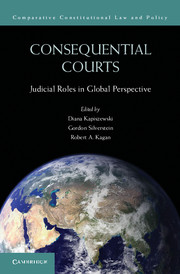Book contents
- Frontmatter
- Contents
- Contributors
- Introduction
- PART I EXPANDING JUDICIAL ROLES IN NEW OR RESTORED DEMOCRACIES
- 1 The Politics of Courts in Democratization
- 2 Fragmentation? Defection? Legitimacy?
- 3 Constitutional Authority and Judicial Pragmatism
- 4 Distributing Political Power
- 5 The Transformation of the Mexican Supreme Court into an Arena for Political Contestation
- Part II EXPANDING JUDICIAL ROLES IN ESTABLISHED DEMOCRACIES
- PART III FOUR “PROVOCATIONS”
- Conclusion Of Judicial Ships and Winds of Change
- Index
- References
1 - The Politics of Courts in Democratization
Four Junctures in Asia
Published online by Cambridge University Press: 05 April 2013
- Frontmatter
- Contents
- Contributors
- Introduction
- PART I EXPANDING JUDICIAL ROLES IN NEW OR RESTORED DEMOCRACIES
- 1 The Politics of Courts in Democratization
- 2 Fragmentation? Defection? Legitimacy?
- 3 Constitutional Authority and Judicial Pragmatism
- 4 Distributing Political Power
- 5 The Transformation of the Mexican Supreme Court into an Arena for Political Contestation
- Part II EXPANDING JUDICIAL ROLES IN ESTABLISHED DEMOCRACIES
- PART III FOUR “PROVOCATIONS”
- Conclusion Of Judicial Ships and Winds of Change
- Index
- References
Summary
Scenario One: In a country with only a decade-old democracy, the country's newly elected president is the ultimate political outsider – an activist lawyer, relatively young, whose party does not hold a majority in the parliament. His opponents launch fierce political attacks, and then impeach him for seemingly trivial offenses. The country's widely respected Constitutional Court is called on to decide whether to uphold the impeachment and decides that, although the president violated the law, he can retain office.
Scenario Two: In a hotly contested presidential campaign he looks certain to lose, the incumbent (another former activist lawyer) is shot the day before the election. He wins by a razor-thin margin, and the election is contested. Meanwhile, the executive and legislative branches set up competing investigative committees to determine the source of the shooting. The election case is sent to the courts to resolve, along with constitutional disputes about the investigative committees. The court holds that the election is valid, the investigation constitutional, and the leader takes power.
- Type
- Chapter
- Information
- Consequential CourtsJudicial Roles in Global Perspective, pp. 45 - 66Publisher: Cambridge University PressPrint publication year: 2013
References
- 10
- Cited by



